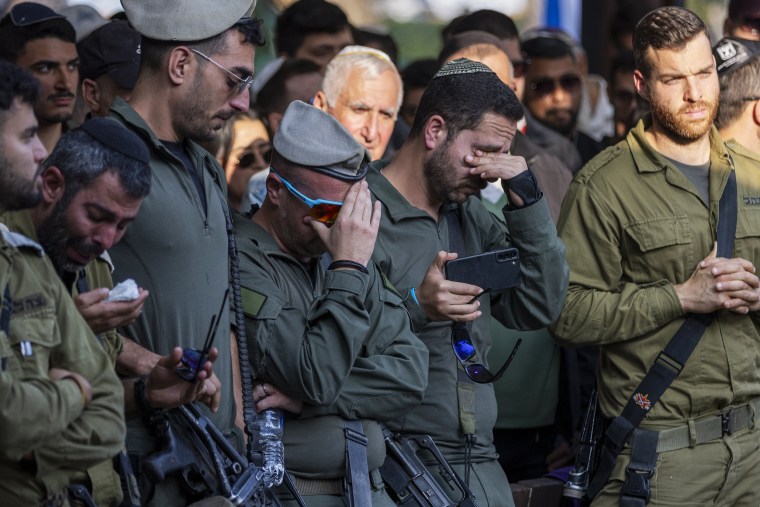Asked about the fratricide rates in the current war with Hamas, the IDF’s main spokesperson, Rear Adm. Daniel Hagari, said it was “a horrible thing.”
Israeli forces are operating in especially difficult circumstances in Gaza, where Hamas fighters disguise themselves as civilians and use their vast network of tunnels to pop up and launch ambushes, he said. “We are learning from every event and doing our lessons learned in order to minimize these horrible accidents,” he added.
A separate IDF investigation concluded that conditions in Gaza helped to explain one of the war’s most notorious incidents of mistaken identity.
When three Israeli hostages, Alon Shamriz, 26, Yotam Haim, 28, and Samer Talalka, 24, were killed after they emerged from a building in Gaza, shirtless to indicate they had no weapons or explosives and carrying a makeshift white flag, anger ignited the country.
But the investigation concluded that the soldiers “carried out the right action to the best of their understanding of the event at that moment,” although the incident “could have been prevented.”
Human rights groups said the killing of the hostages points to a broader endemic practice of Israeli troops’ opening fire without due care, with Palestinian civilians in Gaza paying the highest price.
“The three hostages were killed like this, but we got a glimpse into the way we’re fighting in Gaza and the rules of engagement when it comes to Palestinians,” said Avner Gvaryahu, the executive director of Breaking the Silence, a nongovernmental organization that collects testimonies from Israeli soldiers about their military service.
More than 25,000 people have been killed in Gaza since Israel launched its military assault, according to the enclave’s Health Ministry.
‘Freak accident’
On a chilly evening last week, dozens of civilians and a handful of soldiers gathered under a white tent set up outside a home in the central Israeli city of Hod HaSharon. Platters of food were set up on a table, and whisky was poured into plastic glasses.
The crowd had gathered for the shiva, the traditional Jewish mourning period, for Capt. Ron Efrimi, 26, one of the six soldiers killed in the rocket factory explosion in Gaza.
“I was in his light, not in his shadow,” said his younger brother, Omri, recalling a lifetime of being referred to as “little Efrimi” by teachers and coaches. The two brothers rejoined the reserves and served in Gaza after the Oct. 7 attacks.
Hours before military officials arrived at the home to deliver the news of Ron’s death, Omri said, the family had been stunned to catch a glimpse of him on Israeli television news. Although he was wearing a mask, they immediately recognized him as reporters interviewed him.

Omri, who served as a tank commander, said he did not blame the crew that fired the round that killed his brother. “I think I would do the same thing,” he said, adding that it was the tank’s responsibility to protect the engineers.
“It’s a very freak accident,” he said, not human error. And even if it was human error, “I will hug the men that made the mistake, because I can understand the pressure,” he said.
Stavridis, the retired admiral, said the key to avoiding friendly fire is ensuring communication among different units — infantry, tanks, artillery aircraft — operating with Gaza’s narrow confines.
After it was caught off guard on Oct. 7, Israel mobilized more than 300,000 reservists, some of whom had not served in active duty in years. “Israel did not have the time to take that invading force that was going to go into Gaza and practice and rehearse,” Stavridis said.
He added that senior officers on the ground need to constantly remind troops not to rush during combat.
“That sounds counterintuitive, but once you fire that weapon, that bullet is not coming back,” he said.






